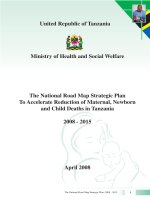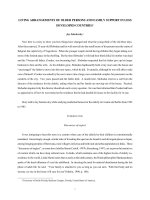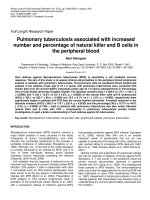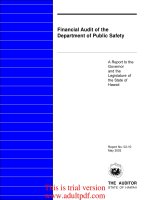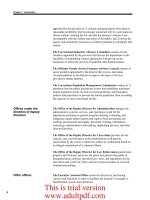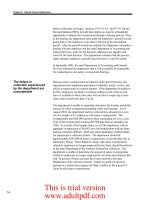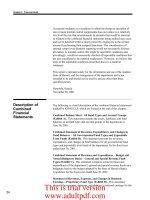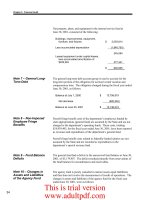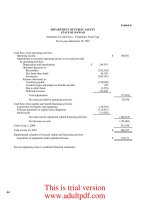Financial Audit of Central Government and NHS Bodies in Wales 2007 _part2 pot
Bạn đang xem bản rút gọn của tài liệu. Xem và tải ngay bản đầy đủ của tài liệu tại đây (279.58 KB, 10 trang )
11Financial Audit of Central Government and NHS Bodies in Wales 2007
Improvements Required Improvement Actions in Place
Over accounts preparation
Audited bodies must ensure that the quality of
their annual accounts and financial information
continues to improve, while still achieving the
accelerated timescales required for their
preparation.
The Assembly Government's Resource Accounting Project Board has
instigated a detailed project plan and monitoring process for the
preparation and audit of the 2006/2007 accounts. This aims to allow
sufficient time for detailed management review, which should assist in
identifying omissions and disclosure errors within the financial statements
prior to their submission for audit.
Over management of expenditure on grants
Where audited bodies provide grants to other
organisations, the funds provided need to be
closely controlled and monitored, in order to
ensure that funds are used for the purposes
intended. As a result, audited bodies need to
ensure that their grant monitoring procedures
are understood and adhered to by all parties
involved.
In March 2007, a Community of Practice for grant management was
established within the Assembly Government. Its purpose is to enable a
continuing exchange of ideas, and the effective dissemination of good
practice throughout the organisation, and the wider public sector in Wales.
The Assembly Government has also arranged training and workshops for
grant claimants, supported by specialist staff from the Wales Audit Office,
which were well attended during the year.
The Assembly Government has asked the Accounting Officers of its
relevant sponsored bodies to review the controls they have in place for the
management of grants expenditure.
Over management of assets
Capital Investment accounts for a significant
portion of Welsh public sector resources; the
total net worth of assets held by public sector
bodies in Wales is nearly £30 billion. Annual
capital spending continues to rise year on year,
with the Assembly Government planning further
spending of some £1.7 billion for 2007/2008.
In order to ensure the efficient utilisation of
existing assets, and the effective targeting of
future capital spending, the Assembly
Government needs to embed effective asset
management arrangements in its procedures,
and ensure a consistent standard of asset
management planning across its sponsored
bodies.
During the year the Assembly Government has made further progress in
developing its asset management systems. This has included:
producing revised asset management planning guidance for all
departments and sponsored bodies;
developing an overarching asset management plan for 2006/2007
covering the whole of the Welsh Public Sector; and
requiring all Assembly Government departments to prepare
comprehensive asset management plans in 2007/2008 which will
underpin an expanded overarching plan.
The Assembly Government recognises, however, that further challenges to
be addressed will include:
improving the consistency, comparability and timeliness of asset
information across the Welsh public sector;
fully integrating asset management plans with other corporate
planning documents; and
developing further the sharing of good asset management
practice across the Welsh public sector.
Figure 1: While improvements are required in some areas, there are a range of actions now being
put in place by the Assembly Government and other bodies to address these
Finance 2.qxp 20/06/2007 16:48 Page 11
This is trial version
www.adultpdf.com
12 Financial Audit of Central Government and NHS Bodies in Wales 2007
NHS Bodies need to improve
their medium term financial
planning
2.7 In examining the NHS accounts each year, I
have a statutory requirement to satisfy myself
that individual bodies have made proper
arrangements for securing economy,
efficiency and effectiveness in their use of
resources. This requirement is also reflected
in my Code of Audit and Inspection Practice.
2.8 In carrying out this work on my behalf,
auditors consider the extent to which each
NHS body has in place appropriate corporate
performance management and financial
management arrangements to support their
business objectives. These arrangements
also represent part of an organisation's
system of internal control, which is essential
to its proper stewardship and governance of
public funds.
2.9 The focus of audit work for the purposes of
my annual conclusion is based on the
evidence of the existence of the
arrangements themselves. My separate value
for money audit work considers where these
arrangements or their operation could be
improved.
2.10 In almost all cases, I was satisfied that
audited bodies had in place the required
arrangements to support the achievement of
their requirement to secure economy,
efficiency and effectiveness in their use of
resources. I was able to identify, however, at
some NHS bodies areas where further
improvements in the range of arrangements in
place could be secured, as shown in Figure 3.
These areas are also of relevance to the
Assembly Government's improvement agenda
for public sector bodies in Wales, aspects of
which I describe in Part 3.
2.11 I raised concerns in my 2006 report that NHS
Bodies in Wales may have difficulty in
meeting their statutory financial duties in
future years
1
. I further observed that it was
questionable whether there were effective
links between the strategic direction of the
NHS in Wales, the implementation of local
plans to better direct resources in the
medium-term to match service requirements
and the annual Service and Financial
Framework arrangements.
2.12 Each year, NHS bodies in Wales are required
to achieve a breakeven financial position
(NHS trusts), or to contain their expenditure
within specified limits (Local Health Boards). I
noted that a significant number of NHS bodies
- seven NHS trusts and two Local Health
Boards - failed to achieve the required
financial duties in 2005/2006. The situation
has worsened during 2006/2007, with
additional bodies reporting a failure to meet
their targets. I look therefore to the
management of NHS bodies to ensure, where
needed, that they have agreed achievable
recovery plans in place. The implementation
of these plans should also be supported by
comprehensive and up-to-date medium term
financial strategies.
The corporate performance management and financial
management arrangements assessed at the audited bodies
include those relating to:
Establishing objectives, determining policy and
making decisions;
Meeting needs of users and taxpayers;
Complying with established policies;
Managing operational and financial risks;
Managing financial and other resources;
Monitoring and reviewing performance; and
Achievement of proper standards of conduct.
Figure 2: Arrangements for securing economy,
efficiency and effectiveness in the use of
resources
1 Financial Audit of Central Government and NHS Bodies in Wales: 2006 - June 2006
Finance 2.qxp 20/06/2007 16:48 Page 12
This is trial version
www.adultpdf.com
13Financial Audit of Central Government and NHS Bodies in Wales 2007
Audited Body Arrangements Areas where further improvement could be made
Arrangements for monitoring and scrutiny of
performance, to identify variances, against
strategic objectives, standards and targets
Monitoring and scrutiny arrangements should be in place, involving
non-executive directors and senior officers, to provide a regular check on
performance against strategic business objectives and give early warning
of potential slippage against targets.
Arrangements to manage significant business
risks
Risk management should be embedded within organisations' corporate
business processes, including strategic and financial planning;
policy making and review; performance management; and reporting to
board members. This ensures that all such processes take full account of
risks and opportunities relevant to their operation.
Arrangements to evaluate and improve the value
for money it achieves in its use of resources
There should be in place agreed plans for improving organisational
efficiency, including specific planned efficiency gains which are quantified,
evidenced and monitored throughout the year.
My review also highlighted the importance of having robust financial planning and financial management
arrangements in place at a time of financial pressures
Having in place a medium-term financial strategy
that is soundly based and designed to deliver its
strategic priorities
Medium-term financial strategies should be in place and linked to a body's
key strategic objectives, taking account of both local improvement and
national priorities. They should model income and expenditure over a
minimum of three years- taking account, as necessary, of different funding
and expenditure scenarios- and be reviewed and updated at least annually.
Financial strategies should also be agreed with partners and other
stakeholders.
Although NHS bodies are funded on an annual basis, this does not remove
the need for formal medium term financial planning. The absence of such
arrangements increases the possibility of risks and opportunities related to
a body's finances and corporate objectives not being identified and
managed appropriately.
Arrangements to ensure that its spending
matches its available resources
Not all NHS bodies were able to meet their statutory breakeven duty.
Where there is an underlying deficit, it is important that agreed recovery
plans are in place to address it. However, for some audited bodies there
was a failure to have plans in place that had been agreed within the
relevant local health communities and with the Assembly Government.
Figure 3: Arrangements in place for securing value for money are generally sound but some
improvements can be made
Finance 2.qxp 20/06/2007 16:48 Page 13
This is trial version
www.adultpdf.com
14 Financial Audit of Central Government and NHS Bodies in Wales 2007
Bodies are continuing to
improve their payment
performance, but still need to
work on some aspects
2.13 Audited bodies are required to disclose their
payment performance within their annual
financial statements. This is the percentage of
creditor payments made within a specified
30 day period. The Assembly Government
has set a target requiring all bodies to pay
95 per cent of their agreed invoices within this
30 day period. The managements of many
audited bodies have reviewed their payment
procedures, seeking ways in which to improve
them.
2.14 The 2005/2006 results saw only a small
number of bodies failing to achieve the target,
with the majority of these falling short by a
narrow margin. All 22 LHBs successfully
achieved the 95 per cent target
for the third successive year, and other bodies
continue to show an overall trend of
improvement in this area. This included the
Assembly Government itself, which met the
95 per cent target this year after failing
narrowly to do so last year.
2.15 An important factor in this improvement has
been the issue by the Assembly
Government’s Finance Department of revised
guidance on the prompt paying of invoices.
This document included examples of good
practice which many bodies have been able
to implement successfully. NHS trusts are
also continuing to seek improvements to their
payment performance. Trusts in North Wales,
for example, are currently piloting a shared
services project, which aims to implement the
good practice demonstrated by the NHS
Wales Business Service Centre which
provides payment and other financial services
to LHBs.
Figure 4: The excellent payment performance of LHBs continues to set a benchmark for other
bodies to follow
Source: Wales Audit Office analysis
Finance 2.qxp 20/06/2007 16:48 Page 14
This is trial version
www.adultpdf.com
15Financial Audit of Central Government and NHS Bodies in Wales 2007
Bodies are improving their
procurement procedures but
need to make further use of
Value Wales
2.16 Value Wales is one of the principal delivery
arms of 'Making the Connections'. Working as
a catalyst for improving public sector
procurement systems, it has an objective to
deliver £120 million per annum in
procurement related efficiency savings by
2008.
2.17 During 2005/2006 Value Wales (Procurement)
(VWP) reported realised savings of
£19 million across the whole of the Welsh
Public Sector, and identified further potential
savings of £64 million as deliverable in 2006.
For 2006/2007 a target of £30 million realised
savings was set, however VWP were able to
achieve these savings in only nine months,
reporting savings of £32 million in
December 2006. Figure 5 demonstrates the
improved savings that VWP are providing
year on year.
2.18 Identified savings continue to rise mainly
because of the increasing collaborative
purchasing of goods and services, including
for example telecommunications, vehicle hire,
and postal services. Savings of approximately
£10 million were also identified following the
implementation of an All Wales Recruitment
web site, and a best practice guide for hiring
agency staff.
Figure 5: Value Wales (Procurement) are providing improved savings year on year
Source: Wales Audit Office analysis
Finance 2.qxp 20/06/2007 16:49 Page 15
This is trial version
www.adultpdf.com
16 Financial Audit of Central Government and NHS Bodies in Wales 2007
2.19 Figure 6 provides examples of the work of
VWP during 2006:
Figure 6: Value Wales made further good
progress in key areas during 2006
2.20 During 2005/2006 as part of my additional
assurance work at AGSPBs, I reviewed the
extent to which they were participating in the
activities of Values Wales. Figure 7 outlines
the areas my staff examined and the detailed
findings.
2.21 Whilst I note that all AGSPBs are participating
in the activities of Value Wales (Procurement)
to some degree, I also look to the senior
management of these bodies to ensure that
their staff are taking full advantage of the
services provided by Value Wales where
these could help enhance further the
effectiveness of their procurement
arrangements.
2.22 NHS bodies have been making extensive use
of collaborative contracts within their
procurement procedures for a number of
years, and already have several modern
procurement systems in place. The NHS
Wales Business Services Centre provides
support services to LHBs in areas where
During 2006 Value Wales:
Awarded Collaborative Procurement contracts with
a value of over £30 million. Further projects with
values of over £380 million were already underway.
Increased the number of professionally qualified
public sector procurement staff to over 120.
Continued to complete procurement fitness checks
for public sector organisations. A total of 32 checks
have now been completed across the public sector
in Wales.
Facilitated the use of e-auctions for £12 million of
procurement expenditure, with a further £350
million in opportunities currently being developed.
Continued to develop the usage of the Welsh
Purchasing Card, with 51 organisations now
participating in the programme.
Value Wales Service Used By Potential for Improvements in Future Years
Buy4Wales Website
This enables purchasers to search for and view
detailed supplier profiles, and access details of
Value Wales collaborative purchase contracts.
All Bodies Whilst all bodies had registered, the actual use made of the
site varied greatly from organisation to organisation.
Audited bodies need to become more actively involved with
the services and activities offered by the Buy4Wales
Website if the service is to be successful in improving
savings across Wales
Collaborative Purchase Schemes
Public organisations act in-consortium to
maximise the potential to achieve value for
money in their purchasing. Such contracts now
include, the Welsh Purchasing Card, vehicle
hire, and IT contracts.
Most Bodies To date, most bodies are only involved in one or two
collaborative procurement projects.
Audited bodies should continue to review the contracts
offered by Value Wales in order to identify further potential
savings. New contracts are negotiated on a regular basis,
and I would expect further procurement savings to be made
in this area in future years
Procurement Fitness Checks
These are designed to help organisations
recognise their procurement strengths as well as
identify areas for improvement.
Most Bodies The remaining bodies were expected to be completed
during 2007.
Those bodies that have completed the Fitness Checks are
currently considering the recommendations made.
Figure 7: AGSPBs are engaging with Value Wales, but could do more to secure savings in
procurement
Finance 2.qxp 20/06/2007 16:49 Page 16
This is trial version
www.adultpdf.com
17Financial Audit of Central Government and NHS Bodies in Wales 2007
there are benefits of scale such as human
resources or finance. In addition individual
NHS trusts often provide specialist services
across the whole of the NHS in Wales. For
example the Bro Morgannwg NHS Trust
manages Welsh Health Supplies, a service
which bulk purchases medical supplies and
distributes them as required across the trusts.
In the past five years this service has
generated overall reported savings of around
£20 million.
2.23 Whilst the NHS in Wales is already using
sophisticated procurement models, it is
currently working with Value Wales to
determine whether procurement practices
could be improved upon and whether current
procurement contracts could be better
provided by Value Wales. It is also providing
its own best practice experiences where these
could be of benefit to other organisations.
Organisations must demonstrate
that they have effective internal
control arrangements for the
preparation of European grant
claims
2.24 The aim of the European Structural Funds is
to reduce social and economic inequalities by
providing grant aid funding for projects which
have been approved under targeted
programmes agreed between the European
Commission and Member States. Funding
from the Structural Funds is provided for
defined periods, known as the 'programming
periods'. There are three programming
periods presently of interest. The current
programming period began on 1 January
2007 and will run to 31 December
2013. The previous programming period
began on 1 January 2000 and ran to
31 December 2006; this was preceded by a
programme that covered the period 1 January
1994 to 31 December 1999.
2.25 In my corresponding report last year,
l reported on progress made in respect of the
closure of the 1994-1999 European
Programmes. As the European Commission's
nominated independent audit body for Wales,
the Assembly Government's Head of Internal
Audit had produced closure reports in respect
of the 18 programmes that operated in Wales,
qualifying all but one of his accompanying
audit opinions. He was able to quantify
specific problems with incurred expenditure
totalling £476,110 and recommended that the
European Commission should accept the
closure of the programmes, after deducting
this amount. The amount involved
represented less than 0.2 per cent of the EU
funds received for the 1994-1999
programming period
2.26 At the time of last year's report, the European
Commission had accepted the Head of
Internal Audit's recommendation in respect of
seventeen of the programmes, and the
relevant financial adjustment was made
during the 2005/2006 financial year.
The European Commission had yet, however,
to complete its deliberations on the Industrial
South Wales Programme, where it was
considering the findings of its own audit as
part of its Europe-wide closure exercise.
The Assembly Government now anticipates
that the financial adjustment for the final
programme will be finalised by the European
Commission during 2007/2008.
Finance 2.qxp 20/06/2007 16:49 Page 17
This is trial version
www.adultpdf.com
18 Financial Audit of Central Government and NHS Bodies in Wales 2007
2.27 The majority of the programmes of the 2000-
2006 programming period are not due to
close until 2008, when the same closure and
audit mechanisms will apply as for the 1994-
1999 programmes. The Wales European
Funding Office and the Assembly
Government's Internal Audit Services have
participated in a UK working group to ensure
the adoption of common standards and
approaches in all relevant UK Departments
and Administrations.
2.28 One programme from the 2000-2006
programming period - the Innovative Actions
programme TASK - was closed in December
2005. The programme covered £2.2 million of
expenditure, supported by £1.6 million of
European Commission funding and the
auditors reserved their opinion in respect of
£115,000 of the expenditure.
2.29 During 2006/2007, the Assembly Government
had in progress significant preparations for
the 2007-2013 programming period, and my
staff participated in a work stream that
considered the mechanisms for audit
certification of projects.
2.30 I will continue to monitor developments
regarding the final closure of the 1994-1999
Programmes, and those in respect of the
subsequent programmes, and will include a
further update in my next year's report.
2.31 During the year to 31 December 2006,
audited bodies submitted approximately
50 European grant claims to my staff for audit
certification. Where my staff found concerns
with the expenditure claimed they were
required to raise observations on their audit
certificates for the attention of the Welsh
European Funding Office, part of the
Assembly Government.
2.32 Overall, my staff found that the regularity of
the expenditure claimed on individual
European projects was satisfactory, and
observations made were often minor in
nature. More work is still required, however,
by managers of European projects to ensure
that they have effective internal control
arrangements in place for the preparation of
grant claims. For example, all grant claims
need to be reconcilable to a spending body's
financial ledgers and supported by a clear
and comprehensive audit trail.
2.33 The Welsh European Funding Office is
developing enhanced guidance for project
managers together with other improvements
in its management arrangements for projects,
and I would expect these to result in further
improvements in the financial controls put in
place by EU grant recipient organisations.
Finance 2.qxp 20/06/2007 16:49 Page 18
This is trial version
www.adultpdf.com
19Financial Audit of Central Government and NHS Bodies in Wales 2007
Part 3 - Changes to corporate and constitutional structures
mean that sound financial management and governance
arrangements are vital if the Welsh Assembly Government is
to deliver its objectives
3.1 In October 2004 the Assembly Government
published 'Making the Connections -
Delivering Better Services in Wales' a
document which outlined in detail the
government's vision for the future of public
services in Wales. Its principal aims were to
assist public services to become, more
citizen-focused; more responsive to the needs
of communities; more focused on equality and
social justice; and more efficient and effective.
3.2 The document identified four main principles
needed to achieve the Making the
Connections agenda, outlined in Figure 8.
Figure 8: Making the Connections identifies four
main principles needed to improve Welsh Public
Services
3.3 More recently, the review by Sir Jeremy
Beecham - Beyond Boundaries - Review of
Local Service Delivery - and the Assembly
Government's response - Delivering Beyond
Boundaries - have also confirmed the
substance and overall relevance of this policy.
3.4 Audited bodies will need to ensure that their
financial management and governance
controls are in line with the requirements of
the 'Making the Connections' agenda.
Achievement of Value for Money is an
important principle here, and I would
encourage audited bodies to consider new
initiatives to ensure that they are making the
best possible use of the resources available
to them.
3.5 As part of my work for 2007, I am conducting
a review across the entire Welsh public sector
to establish the extent to which public
services are meeting the challenges of
'Making the Connections'. The review will
examine issues around joint working such as
objective and target setting, efficiency gains,
performance measurement and validation,
customer focus and leadership.
Citizens at the Centre: services need to be more
responsive to users, with people and communities
involved in designing the way services are
delivered;
Equality and Social Justice: every person should
have the opportunity to contribute and connect with
the hardest to reach;
Working together as the Welsh Public Service:
there needs to be more co-ordination between
service providers to deliver sustainable, quality and
responsive services; and
Value for Money: the need to make the most of
available resources.
Key Considerations in achieving Value for Money
Is there a need to re-design or modernise the
services provided?
Can the organisation maintain its financial health
whilst still attaining the required efficiency savings?
Can improvements to procurement and estate
management provide better value?
Can information technology be used further to
improve service efficiency?
Could improved performance management and
monitoring provide a mechanism to drive forward
improvement?
Finance 2.qxp 20/06/2007 16:49 Page 19
This is trial version
www.adultpdf.com
20 Financial Audit of Central Government and NHS Bodies in Wales 2007
E-Purchases and E-Grant
systems are providing the Welsh
Assembly Government with
improved financial information,
but it can do more to realise the
full benefits
3.6 Later this year, I intend to publish a report
examining in detail the processes and
controls implemented by the Assembly
Government in managing the merger of four
of its sponsored bodies into its structure, and
the extent to which these bodies have now
been successfully merged into the enlarged
Assembly.
3.7 Following the merger of the four sponsored
bodies into the Assembly Government it
recognised the need for a redesigned
corporate governance structure to effectively
manage its newly enlarged organisation.
3.8 The Permanent Secretary, as Principal
Accounting Officer, has delegated some of his
functions and responsibilities to six new
Sub-Accounting Officers. These senior
officials are responsible for ensuring the
regularity and propriety of the finances within
their departments. The Director of Health and
Social Services retains her existing role as
the Accounting Officer for NHS Wales.
3.9 Sub-Accounting Officers each have a
departmental corporate governance
committee and a discrete business unit to
assist them in the exercise of their accounting
officer responsibilities. As with the Permanent
Secretary's own Corporate Governance
Committee, and in line with best practice, the
Assembly Government's Internal Audit
Service and the Wales Audit Office attend
each of these committees. There is also an
independent chair of each committee. This is
either a senior Assembly Government official
employed within a different department, or a
member independent of the Assembly
Government itself.
3.10 The Assembly Government recognised that
robust financial management arrangements
were needed to realise the benefits of the
new structure, and to enable Sub-Accounting
Officers to effectively manage the finances
under their control. These include, for
example, arrangements for the provision of
accurate and timely management information.
In developing these arrangements, the
Assembly Government has taken steps to
enhance its financial systems. These have
included making an increased use of financial
information prepared on a resource (or
accruals) basis. The table below describes
some of the benefits of the use of resource
accounting.
From 1 April 2006, four AGSPBs: the Welsh Development
Agency, the Wales Tourist Board, the National Council for
Education and Training for Wales, and the Qualifications,
Curriculum and Assessment Authority for Wales, were
merged into the Assembly Government.
As at 3 May 2007, each Sub-Accounting Officer has
responsibility for one of the following areas:
Social Justice and Regeneration;
Education, Lifelong Learning and Skills;
Enterprise, Innovation and Networks;
Environment, Planning and Countryside;
Local Government and Culture; and
Public Services and Performance.
Finance 2.qxp 20/06/2007 16:49 Page 20
This is trial version
www.adultpdf.com

